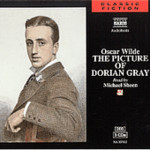
The Picture of Dorian Gray (Abridged)
 $40.00
Out of Stock
$40.00
Out of Stock6+ weeks add to cart
OSCAR WILDE
The Picture of Dorian Gray (Abridged)
Read by Michael Sheen
[ Naxos Audiobooks / 3 CD Box Set ]
Release Date: Thursday 1 March 2007
This item is currently out of stock. It may take 6 or more weeks to obtain from when you place your order as this is a specialist product.
Murder, intrigue, decay of the body and soul - The Picture of Dorian Gray is far removed from the popular view of Oscar Wilde as a writer of delicate social comedy.
It is also difficult to avoid the view that Dorian Gray, Wilde's only novel, is heavily autobiographical, in a metaphorical, if not literal sense. While none of its male characters can be said to be Wilde himself, each occasionally reveals a mood, or expresses a thought, which feels quintessentially to be of the man himself.
The main idea for the story came from an actual episode. In 1884, Wilde used often to drop in at the studio of a painter, Basil Ward, one of whose sitters was a young man of exceptional beauty. Incidentally, Wilde must have been a godsend to many painters of the time, as his conversation kept their sitters perpetually entertained. When the portrait was done and the youth had gone, Wilde happened to say 'What a pity that such a glorious creature should ever grow old!' The artist agreed, adding 'How delightful it would be if he could remain exactly as he is, while the portrait aged and withered in his stead!' Wilde expressed his obligation by naming the painter in his story 'Basil Hallward'.
First published in Lippincott's Magazine in 1890, then revised and expanded when published in book form in 1890, Dorian Gray mixes elements of grand guignol with dastardly deeds in the mode of supposedly decadent, late 19th century French fiction. Handfuls of epigrams are tossed in, like diamonds scattered in a coal cellar.
This tale of moral decay and social opprobrium, laced with macabre supernatural touches, is chillingly distinct from Wilde's plays, where witty glitter holds together unlikely plots. Dorian Gray still has the power to disturb, even though today's bourgeoisie is much less shocking than in Wilde's day.
Oscar Fingall O'Flahertie Wills Wilde was born in Dublin on October 16, 1854. He studied at Trinity College, Dublin, and at Magdalen College, Oxford, where he won the Newdigate Prize for poetry in 1878. His espousal of the fin de siècle Aesthetic movement, which preached devotion to art above all else, resulted in acclaim from some, deep hostility from others. In 1882 Wilde arrived in North America to give a lecture tour, announcing as he landed that he had "nothing to declare but my genius."
Wilde insisted that art had nothing to do with morality, though paradoxically the central plot of Dorian Gray can be interpreted as establishing precisely the opposite - a conundrum Wilde himself would have undoubtedly have relished. The comedies Lady Windermere's Fan (1892) and The Importance of Being Earnest (1895) established his reputation as a major writer for the stage.
But in May 1895 he was sentenced to two years hard labor, serving the bulk of that at Reading Gaol. Wilde had been found guilty of homosexual conduct, of which the Marquess of Queensberry, father of Lord Alfred Douglas, one of Wilde's closest friends, had publicly accused him. Wilde sued the Marquess for libel, but his action collapsed when the evidence went against him.
He served the full term of his sentence and on release in May 1897 went to France. By now bankrupt, he was joined in France by Douglas, dying in Paris on November 1900 of inflammation of the brain brought on by an ear infection. Before he died, he was received into the Roman Catholic Church.